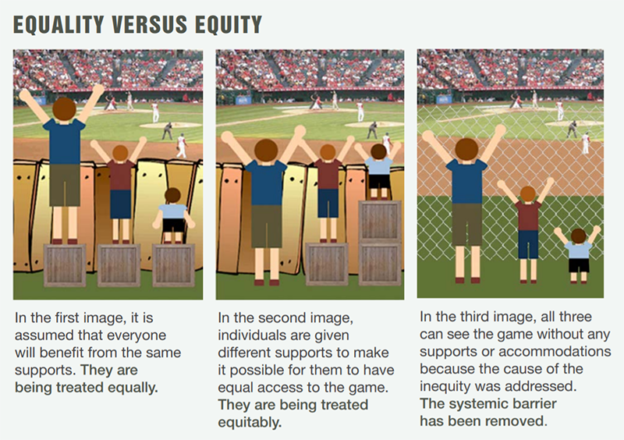When we make an exception for a particular gender, race, religion etc, we imply that an exception is necessary for this class. Which is to imply that this class is somehow deficient. (which is of course insulting and problematic). Am I the only one who sees this?
Not necessarily INHERENT deficiency. Providing exception for someone who grew up oppressed, poor, abused etc can help level the playing fields and doesn’t imply that the oppressed etc person has any inherent deficiencies. Just that they’ve had it harder so far and maybe we should cut them some slack for that.
An exception because of discrimination does not imply the class is deficient. It is because they are at a disadvantage due to circumstances, which in most cases is racism, sexism, or bigotry.
Women were excluded from a lot of sports due to sexism, not physical differences. As in not even being allowed to participate. Women’s sports categories were initially a response to that exclusion, not to address physical differences.
I am aware of the popular narrative.
AND there is this other, implied, narrative.
Both exist.
Both have weight.
This is maybe the most illogical conclusion I have seen written anywhere.
“you say A, I say C, clearly the answer is sort of C but also B”
No, it’s not logical that the correct answer is somewhere between two popular answers. 1+1 does not equal 2.3, just because some people say it’s actually 3
There is no implied narrative of deficiency.
You are inferring a narrative of deficiency based on an assumption.
You are wrong.
When you are handed a crutch it is implied that you cannot walk.
The person handing the crutch may have inferred you need a crutch even though you don’t actually need one.
Does handing a sandwich to someone imply a nutritional deficiency?
Does offering to buy someone lunch imply they have an income deficiency?
Ok, now take it one more step. Why can’t that person walk? Is it because someone broke their leg? In that case, it’s not an ‘exception’ it’s an aid. It makes the situation more equitable.

But only one is currently useful for correcting injustice, while the other is used to perpetute it. So kindly desist.
I think that, by not addressing the implied narrative, you leave it unspoken therefore unargued. Thus giving it power.
Ignorance is no path to success, surely.
I’m addressing it right now, telling you in no uncertain terms that it’s an argument employed by racists to perpetuate racism, and sexists to perpetuate sexism. It’s already been discussed at length and we know where it leads.
You aren’t.
So we live in capitalism. So usually the presumed deficiency is that historically their families were denied opportunities and therefore the candidate has had inherited a lack of opportunities, or would otherwise face a lack of opportunities.
Family capital is very real. Racism is still very real. It’s not that your black doctor had bad grades and shouldn’t have gotten into medical school. It’s presumed he had less opportunities than his white peers who scored sliiightly better, and besides the cut off doesn’t imply lack of ability, it implies a limit on seats in medical school.
It’s ok to say that a certain class is deficient. Sometimes we need to accept that. The problem is that, at this moment, the poverty class is deficient due to our capitalistic system that has oppressed them for years. They are not inherently deficient due to any fault of their own. And unfortunately, a large percentage of those are people of color due to years of systematic racism and discrimination (red lining, underfund education, food deserts, etc).
It’s wrong to say that people of color are deficient because they are people of color. It’s (more) correct to say that deficiencies do exist due to the current/historical structure of our society and we should start to find solutions to these issues.
Racism and insults occur when someone says “systematic racism doesn’t exist so giving these people handouts is unfair to me” or “this person is deficient because they are black.” We need to accept that inequality exists and do our best as a society to help overcome it.
I think this is one of the main reasons that critical race theory became such a hot button issue. This type of systematic inequality needs to be studied and understood so that reasonable, well researched solutions can be discovered. The privileged class is against it because they want to remain privileged; they want the rest of the upper/middle class to put their head in the sand and ignore that the systematic issues exist in the first place, so that fingers don’t end up pointed at them and things won’t ever need to change. It’s easier to demonize the topic all together than to form actual arguments against equality.
Great point: The deficiencies exist in society’s treatment of the class, not in the class itself.
The deficiency is in society’s treament of marginalized classes, not in the classes themselves. Affirmative action, for example, is an indictment of society’s inherent racism and our collective inability to see past race.
If you look at exceptions for race, religion, or gender and see deficiencies in the race, religion, or gender, you are the deficiency.
I think you have identified some small truth, but have made an error in narrowing the scope of where the deficiency actually lies to the individual/group. Exceptions can imply deficiency (among other things) but I would argue that said deficiencies often are in how these groups are treated by society and not inherent to the groups or individuals themselves.
I’m going to use calculus as an example, since there are plenty of reasons you’d expect someone to not be able to do calculus. If you’re sufficiently young, maybe you don’t have the complex reasoning skills to understand calculus (deficiency, but not permanent). If you’re an adult without a math education, would your inability to do calculus be considered a deficiency, or just a lack of opportunity which can be fixed through assistance? If you have been told your kind of person would suck at doing calculus but you really want to learn, and are performing worse than your peers who are told they are good at this naturally, is that a deficiency in the individual or the system they live in? If you have to work more than one job to keep your family housed and don’t have time for calculus, if you are targeted for police violence, if you’re discriminated against by even the most well-meaning people with authority over you, you could be the most brilliant mathematician and it wouldn’t matter- society at large is failing you.
When you’re talking about “exception” here, I think what is really happening is people taking measures to level the playing field for people who have experienced discrimination. In a perfect world with no individual or systemic discrimination, current or historical, these sorts of “exceptions” wouldn’t be necessary! But that’s not the world we live in. The first step to making a more equitable society is recognizing where people got shafted historically and what affect that still has on society today. Getting the short end of the historical stick does not imply immutable qualities about a group of people today.
So, no, I don’t think that giving exceptions to people who need them most inherently implies that they are individually or categorically deficit.
This comment section is exactly what my dumbass teenage brain would have needed to read.
sorry you got downvoted, dr satan. your question is inherently kinda yikes but I had the same thought as a teen. it took me a long time to really get why Affirmative Action != reverse racism.
To answer your question, “Am I the only one who sees this?”, no, you are not, and that’s why we have bigotry in the world.
But just because you “see” something doesn’t mean that that’s what it truly is. I think it says a lot about your thought patterns.
Consider what happened here…
- You observed something, and interpreted it.
- You observed that other people who have observed it did not interpret it in the same way as you.
- Instead of thinking “Why did we interpret this differently”, you instead seem to think that you are the only person in the world who is seeing the truth through your interpretation, and that everyone else is wrong. And that’s the most generous interpretation I can give there…the more likely one (imo) is that you are either doing this in seeking attention or finding like-minded people.
Others have already pointed out that your interpretation is flawed.
In the future, when you find discrepancies between how you see the world and how some others see the world, try to consider some better questions to ask rather than “Am I the only one?”…
- Are there other possible explanations?
- Is my explanation logically flawed?
- What might be influencing my own interpretation of this?
You are correct that exception implies “deficiency”. But, in my view, I think you’re approaching it the wrong way.
Firstly, recognizing that a “class” is “deficient”, in the sense of having special needs, is neither insulting nor problematic. A child has different needs then an adult, which are different from an old person. Not creating “exceptions” for a huge class as children or elderly is the problematic behavior. The same applies for gender, race, religion, and other “class” of people which are not of “cultural dominance”.
So, if the society does to provide “exceptions” for this “classes” of people, the society itself is the one that is “deficient” in providing the needs of its people. Specially if that “system” is already created without those classes of people in mind. Shouldn’t a restaurant, built on the top of a stairway, create a way for persons on wheelchairs to enjoy its food? Or is it insulting for those people to have an accessible way that the majority of the people will not use?
I think you are confused about the source of the deficiency.
When we make an exception for a particular gender, race, religion, etc, we imply that an exception is necessary for this class. Which is to imply that there is a deficiency, but not that it is inherent to that class.
The deficiency being corrected is in society. How society has treated that class is a failing in society itself, and an exception needs to be made to correct (and fix) that deficiency. To take an example you made of handing a crutch, the crutch is going to society to help get their leg (that class) healthy again after what they had done to it, so it can be whole. Ideally, the crutch would be a temporary thing until the body can heal its leg, but the crutch isn’t the solution in itself.
Broadening that out, society has a deficiency as it mistreats, say, trans people. Trans people exist and should be an accepted part of society treated the same as everyone else, but bathrooms, sports, etc, have excluded them or mistreated them. That may not be able to be fixed immediately, but while we work toward a society where bathrooms, sports, etc, are inherently inclusive of trans people (I can’t sat for certain how that would look), exceptions must be made to keep society functioning reasonably while it heals its deficiency (like a crutch for a person who broke their leg).
I hope that clarifies things for you. Your assumption that the deficiency is inherent to the marginalized group is what is faulty.



